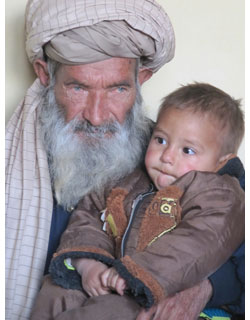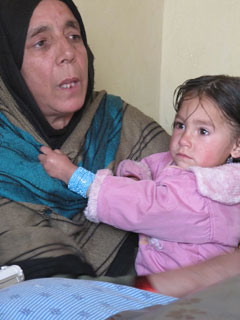Truthout is an indispensable resource for activists, movement leaders and workers everywhere. Please make this work possible with a quick donation.
January 3, 2012, Kabul – Bibi Sadia and her husband Baba share a humble home with their son, his wife and their two little children. An Afghan human rights advocate suggested that we listen to Bibi's stories and learn more about how a Pashto family has tried to survive successive tragedies in Kabul.
Holding her three-year-old granddaughter in her arms, Bibi adjusted her hijab and launched into a narrative that began during the Soviet occupation.
The mujahideen asked Baba to bring them medicines two or three times a week for those injured in the war. For each batch of medicines that Baba delivered, the mujahideen paid him a small sum of money. When the Russian occupiers discovered what he was doing, they beat him severely. After that, the mujahideen accused him of spying for the Russians, and they also beat him badly.
The vicious beatings gave him perforated eardrums requiring six operations and left him permanently hard of hearing.
They also left him mentally unsound so that Bibi became the sole breadwinner for the family. “During the time of the Taliban,” Bibi tells us with a soft smile, “I used to make bread, wash clothes and reap other people's wheat to earn a living.” The mujahideen, having ousted Russia's favored government and its army, were now in power, and they frowned on women working. “I used to work by the moonlight, sewing clothes from animal hide,” said Bibi.

Baba Sadia holds his grandson in Kabul, Afghanistan. (Photo courtesy of Kathy Kelly)
Eventually, Bibi found work as a cleaner at the Aliabad Hospital in Kabul. One evening, the Taliban came to the hospital and insisted on taking a particular male staff member away. Warned by the hospital manager, the man in question managed to escape, but Bibi was not so lucky. When the Taliban spotted her working, they started slapping her.
“I crouched in a corner and didn't speak,” she recounted. “When the hospital manager asked them why they were beating me, they said they had previously warned me against working at the hospital, and that I hadn't heeded their warnings.” This incident was actually Bibi's first warning, but it was not her last.
The Taliban came back and spotted her. When they demanded to know why Bibi was still at the hospital, the manager told them that Bibi was poor, that her husband was too sick to work, and that the Taliban should not beat her but help her as they should help any fellow Afghan. The Taliban accused Bibi of lying and slapped her a few more times before Bibi left the room and started cleaning a corridor. When a Talib spotted Bibi cleaning the corridor, he ordered her to stop work and go with him. The manager, desperate, told the Talib that Bibi could not voluntarily leave until her shift ended and tried to find out where the Talib would take Bibi, but the Talib said it was nobody's business but theirs.
“They argued for a long time,” said Bibi, “but finally, the manager had to let the Talib take me. I put on my burqa and the Talib put me in a car.” They were sending Bibi home, where they could check her story. “The Talib got into another car, along with four other Talibs and followed the car to my home. I had earlier told Baba that the Taliban who had been threatening me may one day take me away or kill me.”
When they reached her home, she hastily urged her husband not to speak rudely to the Taliban, as they were there to learn about her home situation and might then leave the family unmolested. Following protocols of hospitality, Bibi told her daughters to make and bring tea for the Talibs. The main Talib responded frighteningly, saying he would not drink the tea the girls had made him until he himself had brought “expenses” to them as part of a dowry for marrying one of the girls.
Meanwhile, another Talib asked Bibi for forgiveness for hitting her – he had inspected the home and told the main Talib that Bibi had told the truth about her family situation. Bibi replied, “I am like your mother, and when you hit me, you had simply hit your own mother.” The main Talib responded by telling Bibi she must give him one of her daughters – any of them, aged 1 to 15 – in marriage. He declared that from the many resources he had access to, he would, of course, help support the family so Bibi would not have to work, but that it would have to be a “dowry” in order to prevent Bibi's neighbors from accusing the Talibs of favoritism.
Baba told the Talib that he had a 12-year-old daughter. He said that the Talib should return another day while he consulted other family members about giving that daughter to the Talib.
Baba's and Bibi's 12-year-old daughter was eventually given in engagement and then marriage to the Talib, who took her to Zadaran, in the province of Paktia. When Bibi went to visit her daughter, she saw that the Talib's house had many cupboards filled with weapons hidden under sacks of hay. In another corner of the room was a rock on which the bread was made. There was only one bed. Bibi stayed there for several nights but eventually, she had to leave her daughter behind.
In the months following, Bibi's daughter was brought to visit her several times. Each time, she begged not to go back to Paktia. “You could tear me to many pieces,” said the daughter, “and even then, I wouldn't want to go.” But there was nothing to be done.
Bibi was working at the hospital one day when she received urgent news to go home. When she arrived, she found the corpse of her 12-year-old daughter there, wrapped in a funeral cloth.
After eight months of marriage to the Talib, Bibi's daughter had died.
Eventually, with the help of a medical doctor who loaned Bibi money for a dowry, she was able to arrange for her son to marry. Now, with her salary from working in the laundry at a hospital in Kabul, Bibi has managed to pay the doctor back and, with her son, who works at odd jobs, to cover minimal housing and food costs. Bibi thinks the chemicals at the hospital laundry are ruining her health. She suffers from diabetes, gastric ailments and respiratory problems. But at least she is able to buy food. She remembers earlier years when circumstances forced her to line up at 1 AM to receive bread from a nongovernmental organization because, with the family dependent on her to earn a living and take care of the small children, that was the only time of day or night she could spare.
After hearing Bibi's story, a group of young activists known as the Afghan Youth Peace Volunteers, several of whom have also lost family members during the decades of war and occupation, asked if Bibi had any advice for them.
“May God save you from death, that you may help the poor,” said Bibi. “May God give you good health. May God improve security, that we may not see worse days.”
Raz Mohammed, a Pashto youth volunteer, told her about how his brother-in-law was killed in a drone attack. Raz expressed how much he hoped that peace would come.
“So many of our people, including the able and clever, have been killed by the commandants for their own benefit,” Bibi responded. “May God get rid of war, of suicide bombers and mines.”
“How can we unify the people?” asked Faiz, who, as a child, watched Hazara fighters murder his brother.
“Yes, people are divided,” Bibi told him. “Everyone is worried and perplexed. May God bring security and cause the people to be of one hand. May the Taliban or bad days not return.”
“It will be difficult,” she added. “But we are all Muslims, and of one family. Everyone has seen bad days. Not only me – everyone!”
Mohammed Jan, a volunteer from Daikundi province, asked Bibi how Afghan youths could gain the trust of people and work toward unity.
“No one can work alone,” Bibi answered. “One hand cannot clap. We should come together, whether Pashtun or Uzbek or Tajik. May God bring all of us together and place mercy in our hearts. How could people kill so many others, a few from every household?”
“Many people have been killed,” said Mohammed “How do we solve this? Through taking revenge or through forgiveness?”
“Revenge!” Bibi exclaimed, laughing in jest.
“But if we take revenge, it will get worse,” said Mohammed.
Bibi quickly agreed. “Yes,” she said, nodding as she rocked her granddaughter in her arms. “If we can be reformed, it's better to come together and build something together.”
“That is, to forgive?” asked Raz.
“Yes,” Bibi replied, “to forgive.”
A terrifying moment. We appeal for your support.
In the last weeks, we have witnessed an authoritarian assault on communities in Minnesota and across the nation.
The need for truthful, grassroots reporting is urgent at this cataclysmic historical moment. Yet, Trump-aligned billionaires and other allies have taken over many legacy media outlets — the culmination of a decades-long campaign to place control of the narrative into the hands of the political right.
We refuse to let Trump’s blatant propaganda machine go unchecked. Untethered to corporate ownership or advertisers, Truthout remains fearless in our reporting and our determination to use journalism as a tool for justice.
But we need your help just to fund our basic expenses. Over 80 percent of Truthout’s funding comes from small individual donations from our community of readers, and over a third of our total budget is supported by recurring monthly donors.
Truthout has launched a fundraiser to add 432 new monthly donors in the next 7 days. Whether you can make a small monthly donation or a larger one-time gift, Truthout only works with your support.
